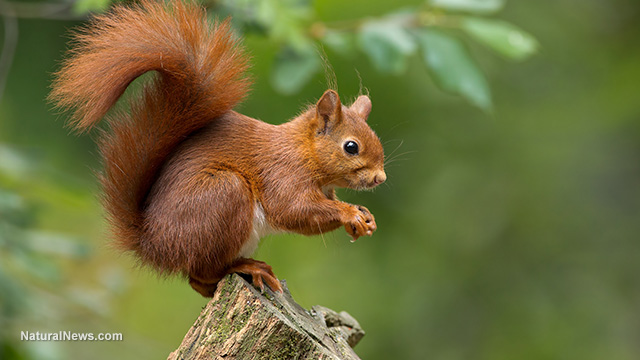Warning: Red squirrels could be spreading human leprosy in the UK
Friday, November 18, 2016 by: Isabelle Z.
Tags: leprosy, red squirrels, disease

(NaturalNews) People who are concerned about their health often focus on preventing modern illnesses like cancer, but one disease that few people give much thought to these days is leprosy. However, this disease, which was once eliminated as a public health problem, appears to be making a comeback thanks to an unlikely ally: the humble red squirrel.
Britons are being warned to stay away from these critters to avoid contracting the disease. One strain in particular shows some concerning similarities to the strain that caused outbreaks of leprosy in medieval Europe, and it's currently plaguing red squirrels on the island of Brownsea in the UK, which is situated off the coast of Dorset. It has also been found in red squirrels living in other areas of England as well as in Ireland and Scotland.
Some infected squirrels show no outward signs of leprosy
After testing samples from 25 of the animals, researchers discovered that all of them had been infected with the Mycobacterium leprae bacteria. Some were suffering from hair loss and swelling, while others carried the disease despite not showing any signs of it. Even more disturbingly, it was discovered that they were not merely carrying an animal version as previously thought; instead, they were carrying human leprosy.University of Edinburgh Royal School of Veterinary Studies professor, Anna Meredith, told the Indepdent that 95 percent of people are unable to contract leprosy, and the bacteria that causes it cannot survive outside of the body.
Even though the risk to humans is not very great, an outbreak could still occur if precautions are not taken. People are being advised to avoid coming into contact with the squirrels, and to wash their hands before eating. Leprosy is mainly spread through coughing and sneezing.
The scientists say that their bacteria samples indicate that leprosy could have been affecting Brownsea's red squirrels for centuries. The red squirrel is already an endangered species, and there are worries that the spread of the disease could threaten their existence. There are fewer than 140,000 of the rodents remaining in the UK, and scientists predict that they could disappear from Britain entirely within the next decade. They are also being threatened by squirrel pox carried by gray squirrels and exacerbated by habitat loss.
Early detection vital in curing leprosy
According to the World Health Organization, the disease's incubation period is around five years, and it could take as many as 20 years for symptoms to appear. Leprosy can be cured with medicine, but getting early treatment is vital for preventing disability and deformities. When left untreated, leprosy can lead to permanent damage to the nerves, skin, eyes and limbs.Even though the disease's prevalence rate dropped by 99 percent in the years from 1983 to 2014, a total of 211,973 new cases of leprosy were reported around the world in 2015 alone. While people who live near the affected squirrels should not panic, they do need to be vigilant. Although some infected squirrels have lesions on their snouts or ears, others show no signs of the disease, so all should be treated with caution.
The researchers are calling for further studies on red squirrels and other rodent populations in other parts of the world to determine if animals could serve as a reservoir for leprosy and contribute to its spread among humans.
Could leprosy become the next Zika virus? With new disease epidemics making headlines all the time, it's important for people to keep their defenses up. This means exercising regularly and eating a clean, healthy diet that contains plenty of antioxidant-rich fruits and vegetables.
Sources include:
Independent.ie
WHO.int
DailyMail.co.uk
Leprosy at FETCH.news
Get independent news alerts on natural cures, food lab tests, cannabis medicine, science, robotics, drones, privacy and more.
Take Action: Support Natural News by linking to this article from your website
Permalink to this article:
Embed article link: (copy HTML code below):
Reprinting this article:
Non-commercial use OK, cite NaturalNews.com with clickable link.
Follow Natural News on Facebook, Twitter, Google Plus, and Pinterest
- The hidden war above: Chemtrails, HAARP and the battle for planetary control
- CLOT SHOT PLANDEMIC UNFOLDING: Fibrous, rubbery clots caused by covid injections have prion-like seeding activity
- Widespread social and economic unrest: Steve Quayle issues urgent financial warning of imminent asset collapse in new interview with Mike Adams
- DEATH by VACCINE or face PRISON time: Canadian Freedom Convoy leaders CONVICTED for protesting forced vaccination during the Covid Plandemic
- Hidden toll: Federal secrecy shields wind industry's eagle deaths to protect land-hungry turbines that yield minimal power
- 7 Must-have multi-functional survival tools for every prepper
- Idaho Gov. Brad Little vetoes Medical Freedom Act
- How to detox from metals falling out of the sky
- Global pedophile ring “Kidflix” shut down in landmark Europol operation
- Mark Zuckerberg's Meta allegedly trained AI on millions of stolen books from “shadow libraries”
- Top German general admits that CONSCRIPTION is “absolutely” necessary to combat Russia
- U.S. Military EXITS fake “Climate Change” hoax after a DECADE of wasting time, money, manpower and resources
- Rep. Jamie Raskin demands that 17 deported Tren de Aragua and MS-13 gang members be returned to the U.S. from El Salvador
- “Rockefeller Medicine Men”: Today’s healthcare crisis stems from the creation of the American medical establishment
- Aerosolized bioweapons? Strange “diploid biomasses” falling out of the sky in Florida captured under the microscope
- Trump administration SUSPENDS federal grants to Princeton University amid antisemitism probe
- How the peanut allergy epidemic was fueled by faulty science and institutional arrogance
- U.S.-China trade war escalates amid fentanyl crisis and rising geopolitical tensions
- Aerosolized bioweapons? Strange “diploid biomasses” falling out of the sky in Florida captured under the microscope
- European Court of Justice: Healthcare professionals who promoted or administered COVID-19 vaccines are CRIMINALLY LIABLE for any harm caused
- Newly released JFK files reveal Pentagon's role in creating Lyme disease and covid in the same lab
- Analysis: The coming economic collapse, a mass uprising and Trump's three secret weapons to halt the growing revolt
- FBI imposed gag order on agents to silence Hunter Biden laptop truth before 2020 election, new chat logs reveal
- Britain’s descent into police state censorship: Parents raided for questioning their daughter’s school system online
- “Project Aldrin”: Senate probes Meta's alleged censorship dealings with China
- Kiss Your Genetic Privacy Good-Bye! 23andMe Gets Green Light to Sell Your Intimate Genetic Details to Anyone They Want
- Oncologist warns of ‘terrifyingly aggressive’ cancers in children, linked to immune suppression from COVID vaccines
- Mike Adams releases country western hit single: Goin’ Back in Time is Comin’ Home
- Utah governor allows ban on LGBT pride flags in public buildings and schools, will take effect without his signature
- AI-powered forecasting model proves more accurate than traditional systems at predicting the weather
- When antibiotics are unavailable, natural ANTIMICROBIAL compounds become essential first line defenses against infection
- German researchers find link between mRNA vaccines and GENETIC CHANGES that precede CANCER and AUTOIMMUNE DISORDERS
- Defunding DEADLY mRNA jabs: Government funding for mRNA technology being scrutinized and sidelined until proven "safe and effective" for real
- The Health Ranger releases “Vaccine Zombie” song and music video, using AI-animated zombies for the music video
- Dr. Mary Talley Bowden drops bombshells about children being permanently damaged by mRNA jabs during Tucker Carlson interview
- The hidden war above: Chemtrails, HAARP and the battle for planetary control
- Newly released JFK files reveal Pentagon's role in creating Lyme disease and covid in the same lab
- California's social media censorship law struck down: A victory for free speech or a threat to online safety?
- The Health Ranger releases “Vaccine Zombie” song and music video, using AI-animated zombies for the music video
- Dr. Mike Yeadon releases 15-minute testimony - WATCH - about genocidal intent of COVID “vaccines”
- EPA advisor admits the agency is funneling billions to climate groups ahead of Trump’s return to White House
- Rep. Nancy Mace introduces bill to ban biological males from female facilities on federal property
- Mike Adams releases country western hit single: Goin’ Back in Time is Comin’ Home
- Florida takes a stand: DeSantis proposes permanent ban on mRNA vaccine mandates
- Sugarcane extract superior to cholesterol-lowering drugs?
- Survival 101: Effective EMF blocking techniques
- OpenAI whistleblower who dissented against how the company trained ChatGPT found dead
- CONSERVATIVES SOUND THE ALARM: Big Pharma and the Left trying to force $32 billion money grab from America’s seniors into year-end spending deal
- Pilots report mysterious lights 'moving at extreme speeds' across Oregon skies
- Attorney and TikTok influencer explains how he was offered hundreds of dollars to make false claims about Trump, Republicans
- Trump reverses course on Gaza plan, says “nobody is expelling Palestinians”
- Trump expected to choose Kelly Loeffler as his agriculture secretary even though she was caught INSIDER TRADING during COVID
- MEDICAL BOMBSHELL: FDA admits Covid mRNA 'Vaccines' CAUSE CANCER
- Marketing director responsible for WOKE Jaguar rebrand is also an LGBT activist who supports Black Lives Matter
- Red Cross issues warning to stop blood plasma donations from vaccinated people
- Scientists confirm: GENIUS brain function can be spontaneously unleashed in humans without any apparent cause
- EPA advisor admits the agency is funneling billions to climate groups ahead of Trump’s return to White House
- HYSSOP: What research reveals about the health benefits of this ancient holy herb
- Two containers with completed ballots fall out of truck in Florida
- Fully vaccinated about to see “tsunami” of illness and death, warns virologist
- Global leaders unite to clamp down on “misinformation” with UN-backed Cascais Declaration
- Newly released JFK files reveal Pentagon's role in creating Lyme disease and covid in the same lab
- BREAKING: 2025 NDAA authorizes mandatory military draft of WOMEN across America… as Pentagon pursues global NUCLEAR war with both Russia and China at the same time
- Michael Yon warns of a ZIONIST TAKEOVER in Trump’s second administration
- Ozempic and Wegovy weight loss drugs are injectable LIZARD VENOM PEPTIDES that may unleash a devastating wave of organ failure… side effects align with symptoms of SNAKE BITES
- BOMBSHELL: DNA testing kits are a SCAM to develop ethnic-specific bioweapons
- The Health Ranger releases “Vaccine Zombie” song and music video, using AI-animated zombies for the music video
- Israeli soldiers accused of even more torture and abuse in the West Bank
- These 13 countries just signed an agreement to engineer a global FAMINE by destroying food supply
- NASA admits that climate change occurs because of changes in Earth’s solar orbit, and NOT because of SUVs and fossil fuels
- RFK Jr. clears key hurdle: Sen. Susan Collins backs controversial HHS nominee, signaling a new era for health policy
- Sermon 30: How Jesus reveals Caesar’s FAKE CURRENCY and FALSE AUTHORITY
Science News & Studies
Medicine News and Information
Food News & Studies
Health News & Studies
Herbs News & Information
Pollution News & Studies
Cancer News & Studies
Climate News & Studies
Survival News & Information
Gear News & Information
News covering technology, stocks, hackers, and more



"Big Tech and mainstream media are constantly trying to silence the independent voices that dare to bring you the truth about toxic food ingredients, dangerous medications and the failed, fraudulent science of the profit-driven medical establishment.
Email is one of the best ways to make sure you stay informed, without the censorship of the tech giants (Google, Apple, Facebook, Twitter, YouTube, etc.). Stay informed and you'll even likely learn information that may help save your own life."
–The Health Ranger, Mike Adams












































